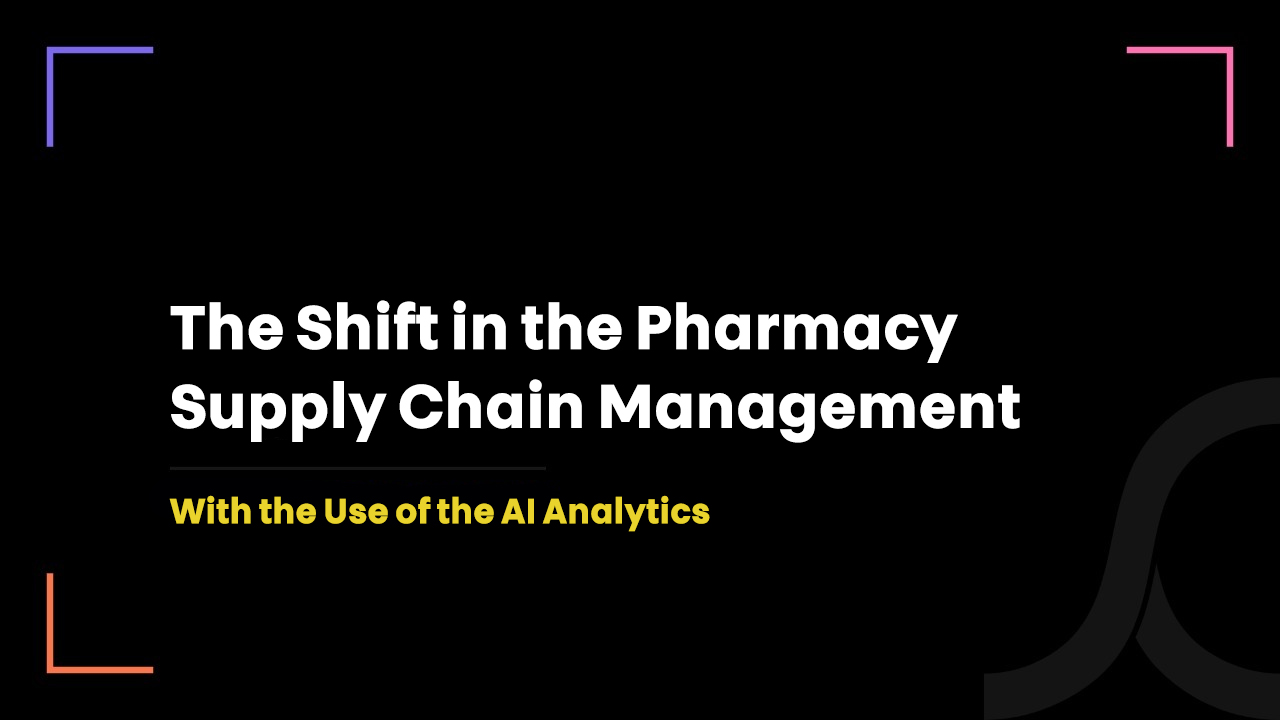AI-Analytics Can Make Remarkable Changes in Supply Chain Management Flow

2 years ago
In the realm of supply chain management,
AI has emerged as a game-changer.
It has revolutionized the way companies streamline their operations.
The Need to Use AI in the Pharmacy Supply Chain
The complexity and sheer volume of data involved in supply chain operations can overwhelm traditional methods.
AI, powered by machine learning algorithms, enables pharmacies to make data-driven decisions swiftly and accurately.
By leveraging AI in supply chain management, pharmacies can
- Gain valuable insights
- Optimize processes
- Enhance overall efficiency
This digital transformation empowers organizations to stay competitive in an increasingly dynamic and demanding market.
The adoption of artificial intelligence (AI) technology in the supply chain is expected to increase by 30% in 2025.

Use Cases of AI in Supply Chain Management
1. Demand Forecasting
AI algorithms can analyze historical data, market trends, and external factors to predict demand patterns accurately.
This enables companies to
- Optimize inventory levels
- Minimize stockouts
- Reduce holding costs
By accurately forecasting demand, pharmaceutical companies can ensure that critical medications are readily available when needed, preventing shortages or excess inventory.
2. Inventory Management
AI can facilitate real-time monitoring of inventory levels and automatically trigger reordering processes when the stock reaches predetermined thresholds.
This ensures efficient stock rotation, minimizes waste, and prevents overstocking or understocking.
Maintaining the right balance of medications is crucial in the pharmaceutical industry, AI-powered inventory management can help
- Prevent drug shortages
- Improve patient safety
- Reduce costs
3. Supplier Management
AI-powered analytics can
- Assess supplier performance
- Track delivery schedules
- Identify potential bottlenecks
This allows companies to make informed decisions when selecting suppliers, negotiate favorable contracts, and maintain smooth supplier relationships.
Ensuring a reliable supply of raw materials and components is vital for pharmacies.
AI can play a crucial role in identifying potential disruptions and ensuring timely deliveries.
4. Warehouse Optimization
AI can optimize warehouse operations by automating tasks such as
- Inventory tracking
- Order picking
- Order packing
This streamlines processes, reduces errors, and improves overall productivity.
Amidst the stringent regulations governing inventory control and storage conditions, AI-driven warehouse optimization ensures compliance and efficient management of temperature-sensitive drugs and vaccines.
5. Route Optimization
AI algorithms can analyze various parameters such as traffic conditions, delivery time windows, and transportation costs to optimize delivery routes.
This results in reduced fuel consumption, improved delivery timelines, and lower operational costs.
As time-sensitive medications and vaccines need to be delivered quickly and efficiently, AI-enabled route optimization ensures timely and safe distribution, especially during emergencies.
Benefits of AI in Supply Chain Management
1. Enhanced Efficiency
By automating routine tasks, AI frees up valuable time and resources, enabling supply chain professionals to focus on strategic initiatives and value-added activities.
This improves overall productivity and drives business growth.
2. Improved Accuracy
AI algorithms can process vast amounts of data and identify patterns that may elude human observers. This leads to better decision-making, reduced errors, and improved overall accuracy.
As precision is crucial for patient safety, AI can help ensure that the right medications are delivered with utmost accuracy.
3. Cost Savings
AI-driven optimization can help streamline processes, reduce inventory holding costs, minimize transportation expenses, and avoid costly disruptions.
This leads to significant cost savings for pharmaceutical companies while ensuring efficient supply chain operations.
4. Agility and Adaptability
AI enables real-time monitoring and analysis, empowering businesses to quickly respond to changes in demand, supply, or market conditions.
Agility and adaptability are valuable in the pharmaceutical industry, where unexpected events and rapidly changing customer needs require swift decision-making and flexible operations.
5. Customer Satisfaction
AI-enabled supply chain management ensures prompt and accurate order fulfillment, faster delivery times, and improved customer experiences.
It often leads to increased customer satisfaction and loyalty.
Challenges of Implementing AI in the Supply Chain Management
1. Data Quality and Integration
Successful AI implementation relies on accurate and clean data from diverse sources.
Data integration and ensuring data quality can be a significant challenge for organizations.
It requires establishing robust data management practices and integrating data from various systems and partners.
2. Change Management
Implementing AI requires a cultural shift within organizations.
It may involve
- Redefining job roles
- Training employees
- Addressing concerns (about automation and job security)
Effective change management strategies are essential to ensure smooth adoption and maximize the benefits of AI.
3. Security and Privacy
As AI relies on data, ensuring data security and privacy becomes crucial.
Organizations must establish robust cybersecurity measures to protect sensitive information.
Additionally, compliance with data protection regulations, such as HIPAA, is vital for maintaining trust and avoiding legal consequences.
4. Scalability
Scaling AI initiatives across the supply chain can be complex, particularly for large organizations with multiple locations, systems, and stakeholders.
Planning for scalability from the outset, including infrastructure requirements and resource allocation, is essential to harness the full potential of AI.
5. Regulatory Compliance
The use of AI in the supply chain must comply with applicable regulations and standards.
Organizations need to navigate legal and ethical considerations associated with AI implementation, particularly in the highly regulated pharmaceutical industry.
Adhering to regulatory requirements while leveraging AI's benefits requires careful planning and collaboration with legal and compliance teams.
The Future of AI in the Pharmaceutical Industry
Precision, compliance, and timely delivery are critical in the pharmaceutical industry.
AI holds tremendous potential.
AI can help
- Optimize drug manufacturing processes
- Monitor product quality
- Track and authenticate shipments
- Detect counterfeit drugs
Furthermore, AI-powered analytics can aid in
- Clinical trials
- Drug discovery
- Personalized medicine
By partnering with SyS Creations, a leading provider of pharmacy solutions, pharmaceutical companies can ensure seamless integration of AI in their supply chain management systems.
It enables them to stay ahead of the curve and maximize operational efficiency while meeting regulatory requirements.
Fill out the contact form and let’s discuss your pharmacy requirements.
